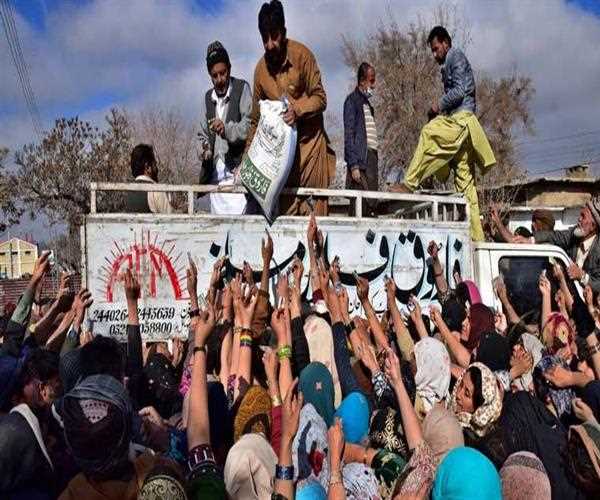
20-Feb-2023
Life in Pakistan is Getting Worse- 2023 view
Pakistan is taking desperate measures to prevent the collapse of its economy, which is in trouble. Because the crisis is so bad, it has decided to sell the property of its embassy in Washington and ordered shopping malls, wedding halls, restaurants, and markets to close early to save energy, which is mostly generated by importing oil.
Despite the fact that the country's economy has been in poor shape for the past few years, a number of factors have contributed to the crisis's recent worsening, including slowed GDP growth, rising global inflation as a result of the Ukraine conflict, plunging currency, which has increased the cost of imports and reduced forex reserves. There is less money left over to pay debts as the economy grows less.
In addition to economic factors, Pakistan was impacted by an unprecedented flood that destroyed a significant amount of property and displaced 33 million people. In its assessment statement, which was released on October 28, 2022, the World Bank stated that the flood's economic losses and damages were estimated to exceed $30 billion, with $14.9 billion in losses and $15.2 billion in damages.
Moreover according to Geo News, Pakistan increased the price of gasoline to Pakistani Rupees (Rs) 272 per liter in an effort to persuade the International Monetary Fund (IMF) to unlock the crucial loan tranche. After a rise of 17.20 yen, the cost of high-speed diesel has increased to 280 yen per liter. After an increase of 12.90 yen, kerosene oil will now be available at 202.73 yen per liter. In the meantime, light diesel oil will cost Rs196.68 per liter following an increase of 9.68.
Here are the facts of the pakistan economic situation that makes the country life shattered
- Nearly all of Pakistan's oil needs are met by imports. The majority of central banks rushed to raise interest rates as global inflation rose. As a result, currencies were put under pressure, and their value against the US dollar decreased significantly.
- Pakistan's rupee fell nearly 30% against the US dollar in 2022, making it one of Asia's worst-performing currencies. Imports became more expensive as the currency depreciated, further depleting foreign reserves.
- Pakistan's forex reserves decreased to less than 6 billion dollars in December 2022, the lowest level in eight years and only sufficient to cover one month's worth of imports.
- The middle class is no longer able to afford necessities like wheat flour due to Pakistan's 33% inflation, which has increased from 19.7% in March 2022.
- Due to a lack of foreign currency, the country has been unable to secure the release of shipments that have been awaiting clearance at the Karachi harbor for the past three months, resulting in an increase in the price of tea and a shortage.
- Millions of used cars have continued to be imported into Pakistan.
- The World Bank predicted Pakistan's economic growth to be less than 2% in FY23 in October. The country is experiencing not only slow growth but also a historic price rise, with a global institution predicting 23% inflation in the current fiscal year as a result of higher energy costs, the weaker rupee, and agricultural production disruptions caused by floods. According to the Pakistan Bureau of Statistics, inflation in Pakistan reached a record high of 24.5% in December.
- Fitch had previously downgraded the nation's long-term foreign currency issuer default rating (IDR) on February 14 from "CCC" to "CCC-," citing an even worsening of liquidity and policy risks. The decline in foreign exchange (FX) reserves to "critically low levels" was reflected in the downgrade, as was a sharp decline in external liquidity and funding conditions.
- The seventh and eighth reviews were completed by the IMF Executive Board on August 29, 2022, and Pakistan was granted access to $1.1 billion. The impending review (the IMF conducts a regular review to check how its bailout money is being spent) delayed the delivery of the subsequent tranche, which was anticipated to begin in September.
- Without the IMF unlocking its funds for Pakistan, the country's reserves could fall below $3 billion and cause it to default on its external obligations.
The future of Pakistan is uncertain. It faces many challenges, both internally and externally. However, it also has potential to become a prosperous and thriving nation. With the right policies and leadership, Pakistan could turn its fortunes around and build a bright future for its people

SEO and Content Writer
I am Drishan vig. I used to write blogs, articles, and stories in a way that entices the audience. I assure you that consistency, style, and tone must be met while writing the content. Working with the clients like bfc, varthana, ITC hotels, indusind, mumpa, mollydolly etc. has made me realized that writing content is not enough but doing seo is the first thing for it.
Join Our Newsletter
Subscribe to our newsletter to receive emails about new views posts, releases and updates.
Copyright 2010 - 2026 MindStick Software Pvt. Ltd. All Rights Reserved Privacy Policy | Terms & Conditions | Cookie Policy